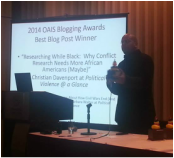Does this mean that we are not living in a democracy? Does this mean that coercion and democratic governance are compatible with one another? Does democracy offer us a way out of this coercive quandary? Existing literature is fairly clear on these questions but popular awareness of this work is limited and, while others that have been studying other topics are chiming in (searching for ways to describe what is taking place), this community has not been sufficiently incorporated into the growing chorus of academic subdisciplines being drawn upon.
When we look at existing research on state-sponsored coercion and force, we see that a few maintain that democracy and coercion are intricately linked to one another - almost by definition (e.g., the Varieties of Democracy project). But a large body of research suggests that democracy and coercion are distinct/independent phenomena: in short, you can have a democracy and have coercion within it. This might not be a democracy that we all like or one that is unproblematic but it is not by definition non-existent. Conceptually, this makes sense. Democracy is enacted by those within the citizenry and is oriented toward providing them voice as well as maintaining the accountability of elected officials in political power. Coercion is enacted by force-wielding government agents (security force personnel or what Micol Seigel calls "violence workers") and is oriented toward providing political authorities with a means to eliminate/constrain behavioral challenges, maintain power as well as to protect existing policies/practices.
But, the two phenomenon can clearly co-exist. For a recent example consider the fact that during the Trump administration we had one part of the US government imposing a ban on muslims, while members of civil society engaged in lawsuits as well as civil resistance and another part of the government (diverse courts) tried to block the ban - inevitably defeating part of the initial effort. This sounds like democracy. Many throughout the world would not have seen resistance, there would have been no lawsuit and there would have been no legal victory let alone the political leadership having to go through another round of trying to get the coercive policy passed before highly restricting its implementation.
While not definitionally connected, the two phenomenon are related. In what is commonly referred to as the "domestic democratic peace” (addressed in my 2007 book by the same name) it is generally believed that democracy decreases state-sponsored coercion/force. Actually, the influence is not this simple. It is only the most complete/fully developed democracies where coercion is reduced and the United States has not always qualified for the highest levels in this designated category. This said, there are many components to democracy with some aspects being better than others at reducing state-sponsored coercion (mass participation such as voting [voice] being greater than checks on the executive [veto]). Some forms of state-sponsored coercion are more amenable to change than others; violent forms are typically harder to reduce than non-violent activities. Having said all this, and this is perhaps one of the most important points in the literature that is ignored by scholars and lay people alike: democracy does not decrease coercion in the context of a behavioral challenge (i.e., violent protest, terrorism and insurgency). This is and always has been the Achilles heel of the domestic democratic peace, despite the fact that most researchers and policymakers ignore it.
This brings us to Biden-Harris. The White nationalist threat (a behavioral challenge), appears that it is going to compel the new leadership to ramp up the effort to identify, prosecute, counter the threat which could involve state-sponsored coercion/force. I know what you are saying. This is a good thing, no? Individuals engaged in violence at the capitol and they have been threatening officials, individuals and diverse organizations throughout the nation. That is true but this is a similar logic to that applied by the Trump administration: they were responding to perceived threats as well; at least, as they framed it.
But, why respond to threats with coercion? Why would the democrats respond in the same manner as republicans? Are the parties not supposed to be different? There are some political as well as philosophical answers that could emerge but I have a different response based upon the last 50 years worth of research on the systematic study of state coercion.
First, state-sponsored coercion does not always work. Indeed, research shows that this behavior is as likely to continue resentment, mobilization and resistance as it is to end it (especially among the hardcore members) unless the Biden-Harris administration is willing to impose severely harsh coercive action? But, why pursue a policy that has a chance of not resulting in the desired outcome (i.e., increased resentment, mobilization and resistance)? Why do something that could make things worse?
Second, newer work of my own with Benjamin Appel shows that once a large-scale, aggressive campaign of state coercion has begun, it is not easily stopped. This could end up being financially as well as politically costly - both domestically as well as internationally with other nations criticizing the United States for their coercive/forceful behavior against its citizens. There is a perception that governments are effective at implementing its policies but 50 years worth of evaluation suggests that this is not always the case when coercion and force is involved. It is not always clear who the enemy is and the search for them is potentially a messy one. This may especially be appropriate in the context of trying to combat white nationalists who may be able to blend into with the rest of the population quite easily.
Third, once the search for behavioral challengers begins, it often extends beyond the initial targets of coercion. The activities employed are not always executed with pinpoint accuracy - especially when members of law enforcement might be sympathetic to the challengers cause. This is especially the case when the potential recruits exist within an especially large population.
Thinking about the white nationalist threat and democratic governance, one wonders if there are other strategies in the toolkit that should be employed? I would argue that discussion/discourse and problem depletion are options that should be considered. Biden-Harris should go into America, not just to identify and eliminate white nationalists as this combines two groups that should not be combined. Rather, they should attempt to identify as well as separate the hardcore, violent criminals/terrorists/insurrectionists from the persuadable masses who have not yet committed any violent acts and who have suffered some form of disconnection from their political as well as economic lives which is why they were susceptible to the hateful and seditious messages in the first place. In short, Biden-Harris should go out into America, hear what people have to say, find the source of their grievance and do their best to fix the relevant problems that prompted the disconnection. This is the most effective way to eliminate violent challenges to the United States government. This is the most effective way to make America whole.
I understand that my suggestion is not an easy one and it might appear odd that an African American is suggesting that we should carefully listen to the white folk of the nation (some of whom wield symbols of intolerance and hate) but my identity is irrelevant to the point being made. We live in a historic period where different communities are being asked to speak and it appears that some are listening. We live in a historic period where the neglected are being given a voice and we have a group of Americans who say that they are not being heard and the response appears to be: "we don’t like how you are responding to your being neglected, so we are going to repress you.” This is not how a democracy should respond. Democracies have institutions and values that are supposed to eliminate the exclusive reliance upon coercion and force which are the tools of those with no other recourse. Enhanced surveillance, agents provocateur, restrictions on speech and assembly, arrests, beatings, torture and killing are the weapons of the truly weak (our mothers and grandmothers as well as Hannah Arendt are correct about this). Biden-Harris should be discussing truth and reconciliation for the aggrieved and grieving, the negatively impacted and the suffering - all of them. We should not simply be going on an unfocused political witch hunt. Rather, we should prosecute those who are breaking the law and using coercion/force or who are planning to do so and, at the same time, we should be utilizing the tools at our disposal in a democracy to separate the former from the latter as well as move the country toward reconciliation and development.


 RSS Feed
RSS Feed
